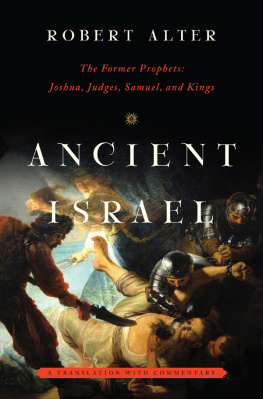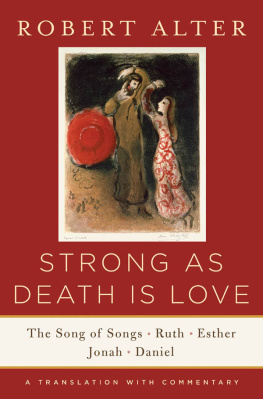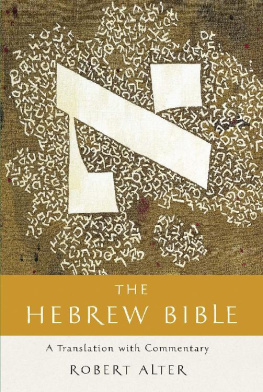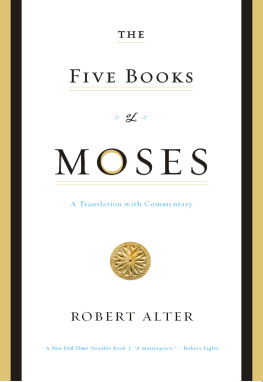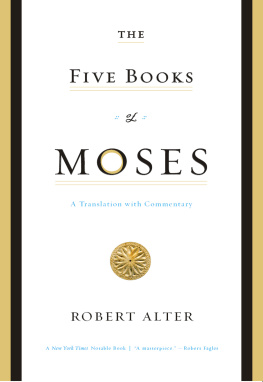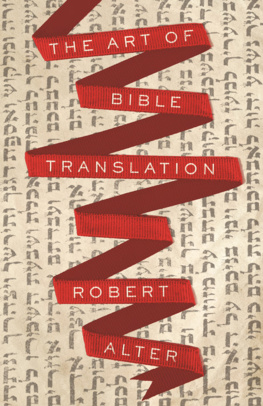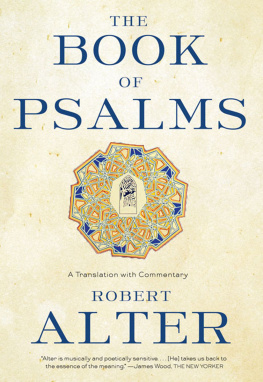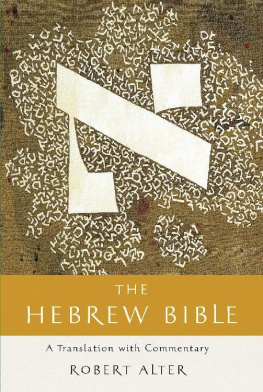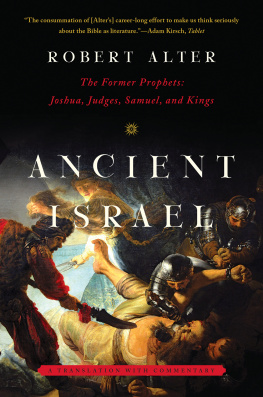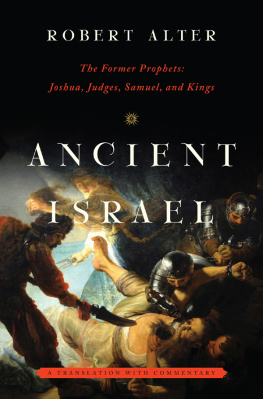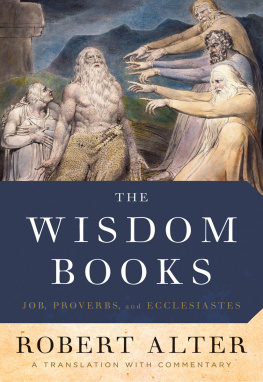R ESEARCH AND SECRETARIAL assistance for the initial phase of this project was provided by funds from the Class of 1937 Chair at the University of California, Berkeley. The bulk of this project was funded by an emeritus research grant from the Mellon Foundation, and I am especially grateful for the generosity of the Mellon support. I am again in debt to Janet Livingstone for her dedicated work as typist. My friend and colleague Ron Hendel reviewed the manuscript and gave me the benefit of his superb command of the scholarship on the Bible and the ancient Near East. Daniel Fisher vetted the translation against the Hebrew, hunting down inadvertent omissions and other lapses. Any slips, of course, in regard to the translation or the notes, that were not caught are my own responsibility.
THE WISDOM BOOKS: A TRANSLATION WITH COMMENTARY
PEN OF IRON: AMERICAN PROSE AND THE KING JAMES BIBLE
THE BOOK OF PSALMS: A TRANSLATION WITH COMMENTARY
IMAGINED CITIES: URBAN EXPERIENCE AND THE LANGUAGE OF THE NOVEL
THE FIVE BOOKS OF MOSES: A TRANSLATION WITH COMMENTARY
CANON AND CREATIVITY:
MODERN WRITING AND THE AUTHORITY OF SCRIPTURE
THE DAVID STORY: A TRANSLATION WITH COMMENTARY
GENESIS: TRANSLATION AND COMMENTARY
HEBREW AND MODERNITY
THE WORLD OF BIBLICAL LITERATURE
NECESSARY ANGELS: TRADITION AND MODERNITY IN KAFKA, BENJAMIN, AND SCHOLEM
THE PLEASURES OF READING IN AN IDEOLOGICAL AGE
THE LITERARY GUIDE TO THE BIBLE
(coeditor with Frank Kermode)
THE INVENTION OF HEBREW PROSE
THE ART OF BIBLICAL POETRY
MOTIVES FOR FICTION
THE ART OF BIBLICAL NARRATIVE
A LION FOR LOVE: A CRITICAL BIOGRAPHY OF STENDHAL
DEFENSES OF THE IMAGINATION
PARTIAL MAGIC: THE NOVEL AS SELF-CONSCIOUS GENRE
MODERN HEBREW LITERATURE
AFTER THE TRADITION
FIELDING AND THE NATURE OF THE NOVEL
ROGUE S PROGRESS: STUDIES IN THE PICTURESQUE NOVEL
, and you shall murmur it day and night, so that you may keep to do according to all that is written in it; then you will make your ways succeed and then you will prosper. Have I not charged you, Be strong and stalwart? Do not be terror-stricken and do not cower, for the L ORD your God is with you wherever you go.
And Joshua charged .
1.. These opening words are an explicit device to create a direct link with the end of Deuteronomy, which reports the death of Moses (Deuteronomy 34:5 ff .), and the beginning of this book, in which Joshua takes up Mosess task.
. This identifying phrase, reiterated in this initial passage, is a formal epithet for Moses, also used in Deuteronomy. Joshua is called his attendant, as he is in Numbers 11:28; the implication is that the attendant of the L ORD S servant will now assume the role of his master.
2.. The repeated use of the deictic zeh , this (and again in verse 4, this Lebanon) is positional. God is addressing Joshua across the Jordan from Canaan. First, He points to this Jordan, across which Joshua will have to take the people, then to this people, whom Joshua must lead, and then to this Lebanon, marking the northern limits of the land.
4.. These are utopianor perhaps one should say fantasticborders never occupied by Israel and never within its military capacity to occupy.
. This can scarcely be the region in Asia Minor that was once the center of a Hittite empire. There were Hittite immigrants scattered through Canaan from an early period. Shmuel Ahituv proposes that the phrase reflects a usage in neo-Assyrian texts where it indicates everything west of the Euphrates, including the Land of Israel.
. The Great Sea is, as elsewhere, the Mediterranean.
6.. This reiterated exhortation clearly reflects the military setting of this initial charge by God to Joshua, who is commander-in-chief of the army about to invade the land.
8.. The book in question is almost certainly Deuteronomy, and the phrasing of the entire verse is strongly Deuteronomistic.
10.. This is the same term used in the Exodus story (5:10 ff .). It derives from a verb meaning to document or record, and so it is not necessarily a specialized military term.
11.. This is a conventional time-span in biblical narrative for an interval of relatively short duration.
13.. The episode of the two and a half tribes that chose to settle on land east of the Jordan is initially reported in Numbers 32.
. The verb here has the obvious technical sense of granting respite from previously hostile neighboring peoples.
14.. The Hebrew amushim appears to derive from the word for five, and it has been plausibly explained as referring to a battle formation, with troops on all four sides and a unit of fighting men inside the rectangle. In modern Hebrew, it means armed.
17.. The Israelites in fact were repeatedly rebellious against Moses, but it is best to view this declaration of unswerving loyalty as an idealized representation of the people, not as an intended irony.
18.. What appears to be reflected in these stern words is the strictness of military justice: Israel is about to enter into battle, and whosoever does not obey the commanders orders will be summarily executed.
. The opening section of Joshua comprises four speeches: God to Joshua, Joshua to the peoples overseers, Joshua to the trans-Jordanian tribes, and the response of the trans-Jordanian tribes to Joshua. These interlocked speeches are meant to convey a sense of perfect solidarity on the eve of the conquest of the land. Thus, the concluding words of the tribal spokesman exactly echo Gods twice asserted exhortation to Joshua, with the addition of the emphatic raq , only.
CHAPTER 2
And Joshua son of Nun sent out in secret .
1.. The two spies evoke the two spies in the story in Numbers 1314. Joshua and Caleb son of Jephunneh, who did not come back with a fearful report like their ten companions. This story, then, on the eve of the conquest, is framed as a pointed reversal of the failed spy mission in Numbers: there the Israelites quail before the gigantic inhabitants of the land; here a Canaanite woman reports that the inhabitants of the land quail before the Israelites.
. This place-name means The Acacias.
. Sometimes biblical usage adds woman in this fashion to the designation of profession. Whore, in turn, seems to be used neutrally, not as a term of opprobrium. Though she may merely be providing the two men lodging, the narrative coyly plays with the sexual meaning of the verb shakhav , which also means simply to lie down, to sleep, or spend the night. Similarly, the verb come to, used in verse 3 and verse 4, also has a sexual meaning when the object of the preposition is a woman. In fact, Rahab in answering the kings inquiry may be saying that the two men were merely her customers, and hence she had no idea that they might be spies.
3.. The king adds whole to the report that has been brought to him: these spies have come on an extensive reconnaissance mission. Jericho is a city-state, the prevalent political form in Canaan in this era, and would have governed surrounding territory.
4.. The sense of the verb is evidently pluperfect: she had hidden the spies before the arrival of the kings emissaries.
. The gates of the walled city were locked at nightfall.
5.. In this shrewd maneuver, Rahab simultaneously makes herself sound like a loyal subject of Jericho and encourages the kings men to leave her house immediately, heading in what she correctly calculates will be the wrong direction.
6.. The flax would have been laid out on the roof to dry in the sun. Hiding in the flax stalks may be a reminiscence of baby Moses hidden (the same Hebrew verb) in the ark among the bulrushes.
7.. This, as Rahab has rightly surmised, would be the most plausible route of pursuit because the men from Jericho are aware that the Israelites are encamped east of the Jordan and assume that the spies will try to reach a ford over which they can cross to return to their people.
Next page
